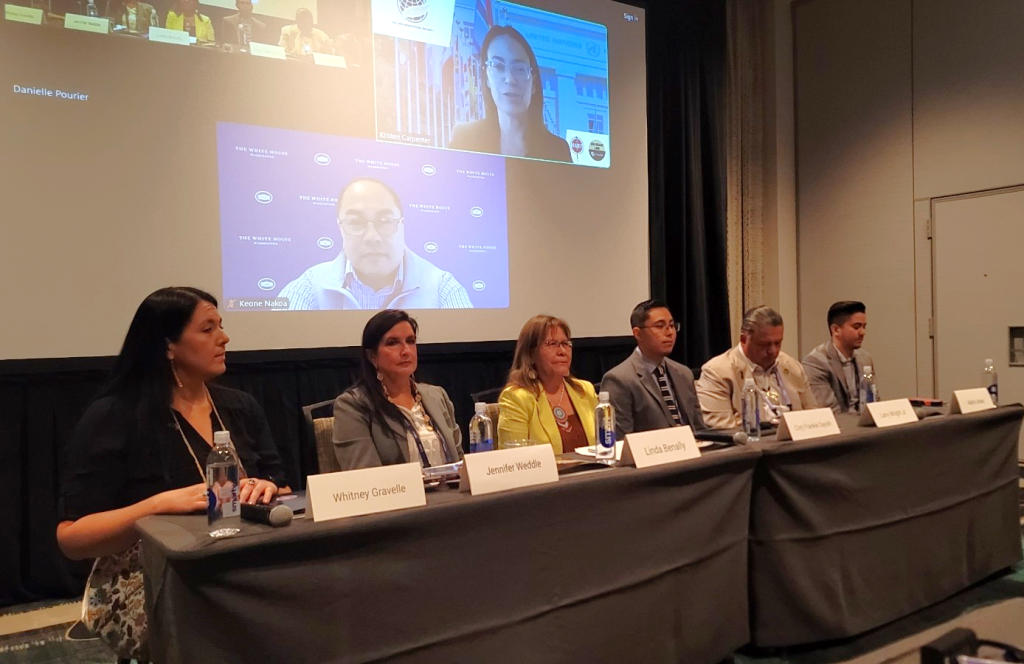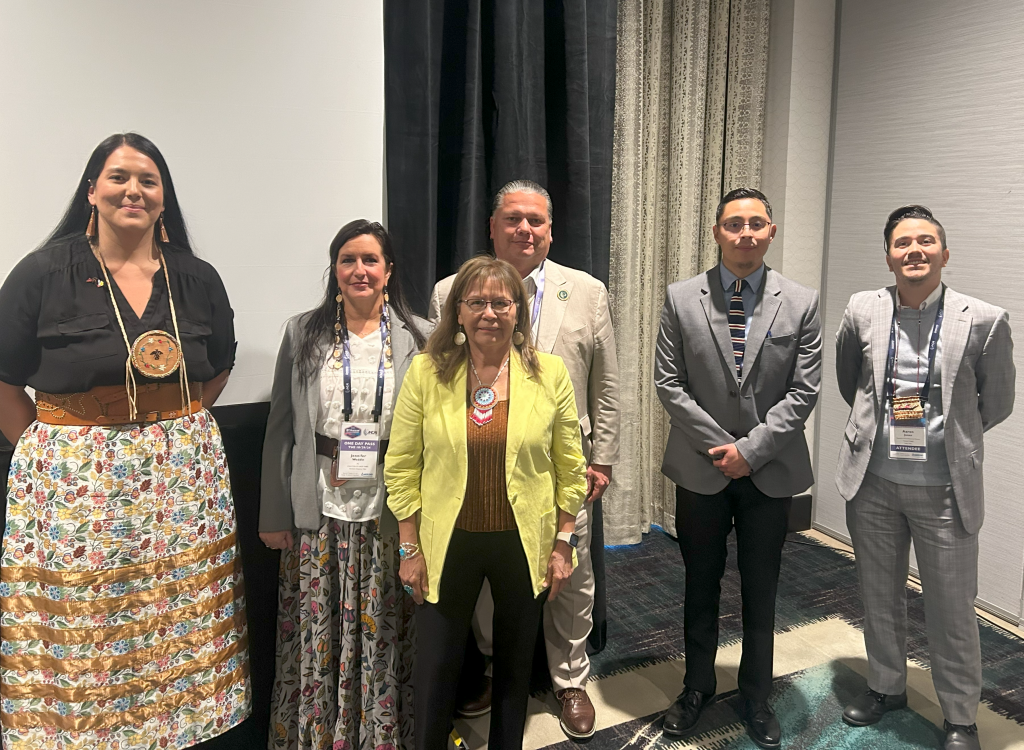The Implementation Project (TIP) had the honor of co-hosting a breakout session at the National Congress of American Indians (NCAI) 81st Annual Convention in Las Vegas, Nevada this year.
Panelists during session. On screen: Keone Nakoa, Kristen Carpenter. In-person from left to right: Whitney Gravelle, Jennifer Weddle, Linda Benally, Cory Frankie Dayish, Larry Wright Jr., Aaron Jones
The breakout session was titled Indigenous Diplomacy: The Indigenous Peoples’ Guide to the United Nations and WIPO’s New Treaty on Genetic Resources and Traditional Knowledge. Seven panelists discussed opportunities for Tribal engagement globally and recent successes including the new UN Treaty on Genetic Resources. TIP unveiled a new publication, The Indigenous Peoples’ Guide to the United Nations, and provided copies to all attendees.
Key Discussion Points
- There is active diplomatic work and advocacy taking place on many issues affecting Indigenous Peoples, including development threats to sacred lands and waters, cultural preservation, sacred sites protection, and protecting Indigenous Peoples’ genetic resources and traditional knowledge.
- The United States government, including the Departments of Interior and State, as well as UN entities such as the World Intellectual Property Organization (WIPO) and World Bank, have increased engagement on Indigenous issues.
- Additionally, several UN mechanisms, such as the UN Permanent Forum on Indigenous Issues and the UN Expert Mechanism on the Rights of Indigenous Peoples, elevate Indigenous issues globally.
- In a recent landmark accomplishment, WIPO facilitated the adoption of the Treaty on Intellectual Property, Genetic Resources and Associated Traditional Knowledge to require patent applicants to disclose the origin or source of genetic resources and associated traditional knowledge used in their inventions. States, WIPO’s Indigenous Caucus, and others worked for many years to achieve the Treaty, which references the UN Declaration on the Rights of Indigenous Peoples and encourages Indigenous participation in the Treaty’s implementation. The U.S. is not yet a signatory to this treaty.
- Speakers highlighted some of the challenges and benefits of advocacy at the international level, and encouraged using the new The Indigenous Peoples’ Guide to the United Nations as a user-friendly source for information and tips for engagement in the various international processes.
This breakout session featured perspectives on interacting with the UN, the value of maintaining cultural resources, and options of support available for Tribal Leaders and communities. All of the seats in the audience were filled with thoughtful attendees, including many who were standing along the walls to participate in this conversation. When the discussion was opened up to the audience, several individuals took to the microphone to share their experiences and challenges as well. All attendees received a copy of The Indigenous Peoples’ Guide to the United Nations, as well as a UN Declaration on the Rights of Indigenous Peoples booklet.
TIP would like to thank all of the panelists and attendees who participated in this session, making the most of the time we had. TIP also thanks Honor Keeler as well as others who contributed to the research and writing of The Indigenous Peoples’ Guide to the United Nations. We would also like to thank our co-hosts: Bay Mills Indian Community, Coalition of Large Tribes, Tulalip Tribes, and the Native American Church – State of New Mexico.
The Panel
Linda Benally – Legal Advisor, Native American Church – State of New Mexico
Cory Frankie Dayish – Science Professional, Navajo Nation
Whitney Gravelle – President, Bay Mills Indian Community
Aaron Jones – Natural & Cultural Resources Director, Tulalip Tribes
Keone Nakoa – AA and NHPI Senior Advisor, White House Office of the Chief of Staff
Jennifer Weddle – Principal Shareholder & Co-Chair, American Indian Law Practice Group, Greenberg Traurig
Larry Wright Jr. – Executive Director, National Congress of American Indians
The Moderators
Kristen Carpenter – Council Tree Professor of Law; Director of the American Indian Law Program at the University of Colorado; and Co-Director of The Implementation Project
Sue Noe – Senior Staff Attorney, Native American Rights Fund; and Co-Director of The Implementation Project
In-person Panelists, from left to right: President Whitney Gravelle, Jennifer Weddle, Linda Benally, Larry Wright Jr., Cory Frankie Dayish, Aaron Jones


